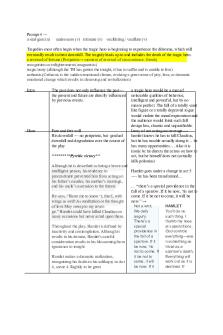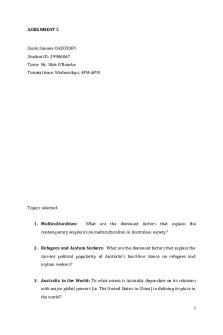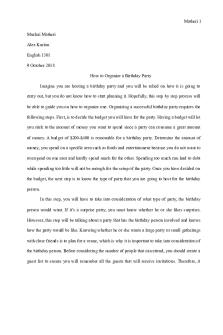FASS2200 Essay 2 PDF

| Title | FASS2200 Essay 2 |
|---|---|
| Author | Lila H |
| Course | Great Books that Changed the World |
| Institution | University of Sydney |
| Pages | 4 |
| File Size | 113.3 KB |
| File Type | |
| Total Downloads | 75 |
| Total Views | 119 |
Summary
Essay submission for the second assignment ...
Description
Paradise of the Blind is a novel written by Duong Thu Huong, a woman born in Vietnam in 1947. Illegally written and banned it Vietnam, the novel was snuck out of the country and become the first book written by a Vietnamese author to be published in the United States. The story takes place during the sixties throughout of the childhood of Hang, a young Vietnamese girl. The novel recounts Hang’s relationship with her family, from her rich Aunt Tam and poor mother Que to her communist Uncle Chinh. As a young woman growing up during the Vietnam War, the themes of the book are intrinsically tied to the rise of communism, and the shifting roles of women in society. One reason Paradise of the Blind should be included in the curriculum is because of how it criticizes the applications of both communist and capitalist ideas. In the Communist Manifesto, Marx and Engels state that in order to implement communism, ten measures must be followed. One of such is “Abolition of property in land and abolition of all rents of land to public purposes” (35). In Vietnam, a land reform act was passed to prevent tenant farming1. All landowners were forced to give up their land and in doing so, were read the laws and humiliated in front of the villages. In the novel, Hang describes how her father’s family had to endure this ceremony stating, “During the second denunciation session, my grandmother and my aunt were forced to squat in a deep pit. In this position, a human being felt the full weight of helplessness. ” (29). Despite the intent for justice posited in the Manifesto, the members of the proletariat and government in Hang’s village took it upon themselves to use these ideals as a basis for their own revenge and pleasure. On the other hand, Hang’s mother Que is a figure which represents the 1 “Vietnam Land Reform.” The New York Times. The New York Times, April 9, 1970. https://www.nytimes.com/1970/04/09/archives/vietnam-land-reform.html.
negative effects of capitalism throughout the novel. Que works as a street vendor and is shown throughout the book to base her self-worth on her ability to make money. At one point as Hang’s wealthy Aunt begins to gift her more things and Que begins to feel unneeded she hides a pair of earrings from Hang. Montaigne addresses situations like these and reflects Aunt Tam’s own rage as she discovers the truth about where her gifts have gone. He states, “[the liar is] ridiculously trapped, ‘for what memory can be sufficient to retain so many different shapes as they have forged upon one and the same subject?”2 . Duong also argues that capitalist society forces its denizens to place too much worth in acquiring money. Another reason Paradise of the Blind should be included in the curriculum is because of how it demonstrates the roles of women in Vietnamese culture. Throughout the novel Hang is constantly debased because of her gender. Because she is a girl, she is not seen as a viable heir to her lineage. Hang’s mother Que after reconnecting with her brother, decides to begin saving money to feed her nephews at the detriment to her own wellbeing. Duong states, “My mother stared adoringly at the heirs to the Do family lineage” (121). By never attaching names to the nephews only ever calling them “the two boys” or “the heirs”, Duong communicates how children are seen as a continuation of a parent rather than as individuals, and how these boys are considered to be of great value to be nurtured in the future. In opposition, women are seemingly valued on their beauty and looks. Hang describes her mother stating, “Her pearl-white teeth glistened, but her beauty and her youth had already faded. From sorrow. For nothing. For no one” (55). Her beauty having “already faded” for “no one” is a powerful statement that brings 2Montaigne, Michel de, and M. A. Screech. The Complete Essays. London, England: Penguin
Books, 2003.
attention to how women’s looks are perceived for a society. Duong criticizes the idea that women’s beauty and youth should be for a man. Jane Austen makes a similar in the beginning of Northanger Abbey when she is first describing Catherine, stating, “To look almost pretty, is an acquisition of higher delight to a girl who has been plain looking the first fifteen years of her life” (3). Austen’s use of satire in this statement criticizes why the idea of beauty should so highly prized among women. This clear of demonstration gender roles is an illumination into Vietnamese society and ties into themes of beauty already present in the curriculum. Paradise of the Blind should be included in the curriculum not only because of how it addresses important themes also present in other novels within the course, but also because of how it fills a whole in the types of content the class looks at. This novel was instrumental in changing how those in Western countries viewed Vietnam and other communist countries surrounding it, especially during a period where little to no information was being received from anyone other than the government.
Bibliography: Duong, Thu Huong. Paradise of the Blind. New York: Perennial, 2002. Bladon, Rachel, Robyn Neild, and Jane Austen. Northanger Abbey. Oxford: Oxford University Press, 2017. Marx, Karl, and Friedrech Engels. The Communist Manifesto. New York, New York: Bantam Dell, 2004.
Montaigne, Michel de, and M. A. Screech. The Complete Essays. London, England: Penguin Books, 2003. “Vietnam Land Reform.” The New York Times. The New York Times, April 9, 1970. https://www.nytimes.com/1970/04/09/archives/vietnam-land-reform.html....
Similar Free PDFs

FASS2200 Essay 2
- 4 Pages

Essay 2
- 5 Pages

Essay 2
- 2 Pages

Tort Essay - Grade: 2:2
- 4 Pages

Essay 2 - Grade: 2:1
- 14 Pages

EC2 Essay PT 2
- 3 Pages

Essay 2 outline
- 4 Pages

Asessment 2 - Essay
- 6 Pages

ATS2269 Essay 2
- 10 Pages

Formal Essay Stage 2
- 7 Pages

Project 2- Essay
- 2 Pages

HLSC111 Assignment 2 Essay
- 7 Pages

Essay 2 - Grade: 85.1%
- 5 Pages

Essay no 2 draft
- 5 Pages

Essay 2 Birthday party
- 4 Pages

Essay 2 - Grade: A-
- 4 Pages
Popular Institutions
- Tinajero National High School - Annex
- Politeknik Caltex Riau
- Yokohama City University
- SGT University
- University of Al-Qadisiyah
- Divine Word College of Vigan
- Techniek College Rotterdam
- Universidade de Santiago
- Universiti Teknologi MARA Cawangan Johor Kampus Pasir Gudang
- Poltekkes Kemenkes Yogyakarta
- Baguio City National High School
- Colegio san marcos
- preparatoria uno
- Centro de Bachillerato Tecnológico Industrial y de Servicios No. 107
- Dalian Maritime University
- Quang Trung Secondary School
- Colegio Tecnológico en Informática
- Corporación Regional de Educación Superior
- Grupo CEDVA
- Dar Al Uloom University
- Centro de Estudios Preuniversitarios de la Universidad Nacional de Ingeniería
- 上智大学
- Aakash International School, Nuna Majara
- San Felipe Neri Catholic School
- Kang Chiao International School - New Taipei City
- Misamis Occidental National High School
- Institución Educativa Escuela Normal Juan Ladrilleros
- Kolehiyo ng Pantukan
- Batanes State College
- Instituto Continental
- Sekolah Menengah Kejuruan Kesehatan Kaltara (Tarakan)
- Colegio de La Inmaculada Concepcion - Cebu